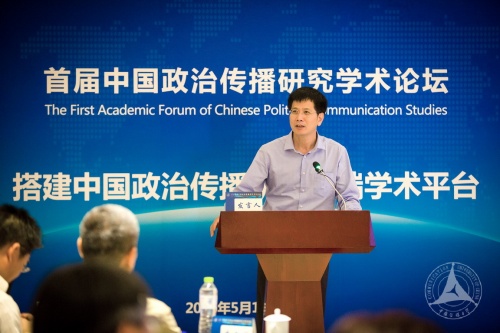Scholars explore political communication strategies in China and abroad

Yu Keping, deputy director of the Central Compilation and Translation Bureau, proposes that domestic political communication shall strive to form an equal, rational and cooperative relationship with the public at the first Academic Forum of Chinese Political Communication Studies.
Political communication studies in China should adopt different strategies at home and abroad in order to receive general acceptance, speakers said at the first Academic Forum of Chinese Political Communication Studies, held at Communication University of China on May 16.
With regard to domestic political communication, Yu Keping, deputy director of the Central Compilation and Translation Bureau, said that the government needs to raise public communication awareness, comply with the rules of political communication, complete institutionalization, strike a dynamic balance anchored in guidance, expand channels for dialogue and employ advanced communication technology, striving to form an equal, rational and cooperative relationship with the public.
As for political communication with other countries, Yan Wenbi, director of the Xinhua News Agency World Service, said that the key is to promote common interest and emphasize common development while telling the truth about China with proper guidance, utilizing new media and innovative formats.
As an emerging interdisciplinary study, political communication is widely applied in campaigns to influence the outcome of elections through opinion polls and media promotion.
Looking back on the progress of the discipline in China, Jing Xueming, director of the Political Communication Institute at Communication University of China, said that since the reform and opening up, large amounts of Western theories have been introduced to China through academic translations, reviews and notes, boosting the discipline’s development.
Jiang Fei, a research fellow from the Institute of Journalism and Communication Studies under the Chinese Academy of Social Sciences, said that political communication has gained vitality through the introduction of standard discourse and its adaptation to Chinese realities.
However, the definition of the discipline remains unclear, Jiang said, adding that Chinese scholars need to figure out a central question moving forward, that is, whether it should be “communication of politics” or “politics in communication.”
Meng Jian, a professor from the School of Journalism at Fudan University, said that for quite a long time, there has been little interaction between political science and communication studies. But with the advent of the digital era and the social transformation in China, political communication has grown from a single discipline into multiple disciplines, and then it further evolved into an interdisciplinary study that involves political science, communication, sociology and psychology.
“Cultivating political culture with Chinese characteristics requires a system of political communication theories and strategies that match the features of China,” Jing said. “An emerging discipline needs to test theories through constant theoretical innovation and exploration in practice,” he noted.
Jing said that the attempt to simply apply Western theories to Chinese political practice creates an awkward dilemma because it will not only miss the essence of those theories but also fail to provide effective support for political promotion in China.
Commenting on the direction of Chinese political communication theories and building a political communication discourse with Chinese characteristics, Jing noted that we are far from constructing a theoretical framework. A series of core issues, including the foundation, axis and boundaries, need to be explored further, Jing said.
In addition, scholars in attendance discussed a series of topics regarding the study and practice of political communication nowadays, including comparative studies on the history of Western and Chinese political communication, studies on contemporary political communication practice in China and contemporary Western political communication theories.
